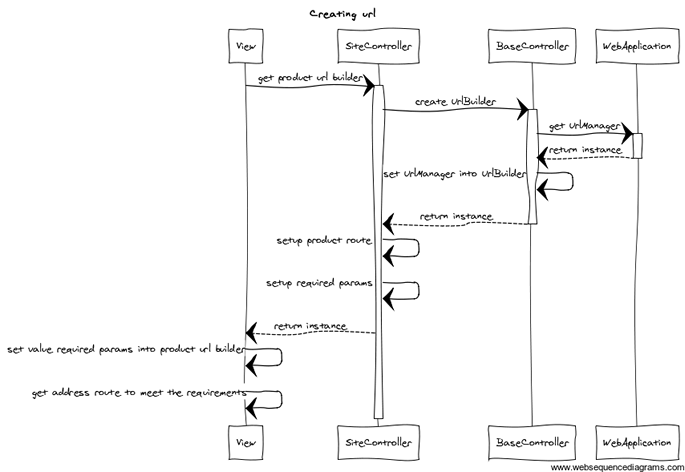You are viewing revision #3 of this wiki article.
This is the latest version of this article.
You may want to see the changes made in this revision.
Statement of problem ¶
Knowledge is necessary to determine the address of the controller in a single layer system. This allows you to quickly search and painlessly produce refactoring controllers and their addresses.
UPD: In order to show the problem more clearly, we can give the following example, when the addresses specified in the system controllers wherever you want, in the controllers, in presentations, sometimes even in client script, and this process becomes unmanageable.
Implement checking adequacy parameters for constructing address. This is necessary if the parameters are set for an address in another layer of the system, such as the representation of a client or a script.
Solution ¶
All addresses must be defined in the controllers. If necessary, you can fill in missing parameters in the presentation layer, or client script.
For convenient operation can determine helper - Builder addresses.

Examples of use ¶
Definition of knowledge about the address in the controller
Abstract base controller. Implementation of the method of creating properties per Builder addresses
class BaseController extends \CController {
public function createUrlBuilder($route, $params = array()) {
$urlBuilder = new UrlBuilder($this->getUrlManager());
$urlBuilder
->setRoute($route)
->setParams($params);
return $urlBuilder;
}
public function getUrlManager() {
$urlManager = $this->getApp()->getUrlManager();
return $urlManager;
}
public function getApp() {
return \Yii::app();
}
}
Concrete controller. Using Builder addresses
class SiteController extends BaseController {
public function actionIndex() {
return $this->render('index', array(
'urls' => array(
'catalog' => $this->createUrlBuilder('site/catalog')
->getUrl(),
// ready assigned address line ?r=site/catalog
),
));
}
public function actionCatalog() {
return $this->render('catalog', array(
'products' => Product::model()->findAll(),
'urls' => array(
'product' => $this->createUrlBuilder('site/product')
->setRequired(array('id')),
// passed to the builder with the necessary knowledge about the controller,
// required parameters are defined, which are filled in the representation
),
));
}
public function actionProduct($id) {
return $this->render('product');
}
}
Presentation of output product catalog (catalog.php)
/** @var UrlBuilder $productUrlBuilder */
$productUrlBuilder = $this->getParam('urls.product');
foreach ($this->getParam('products') as $product) {
$productUrl = $productUrlBuilder
->copy()
->setParam('id', $product->id)
->getUrl();
print($productUrl);
// address string ?r=site/product&id=1
}
// or pass parameters url builder the client script
$this->setJsParams(array(
'urls' => array(
'product' => $productUrlBuilder->toArray(),
),
));
Source Code ¶
Source Code Url Builder
If you have any questions, please ask in the forum instead.
Signup or Login in order to comment.